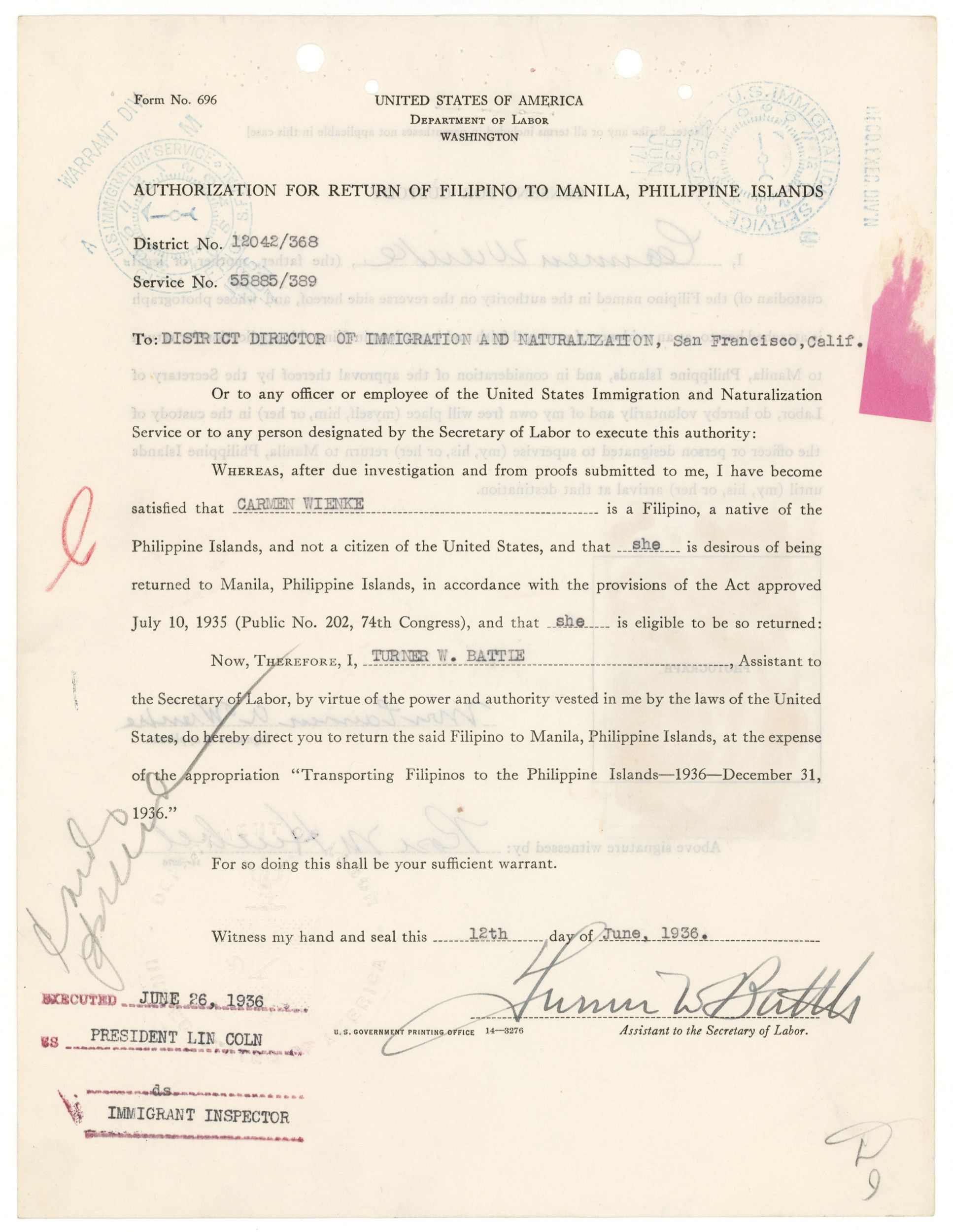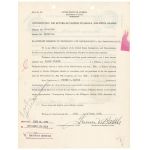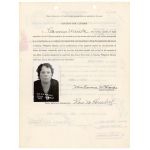Authorization for Return of Carmen Wienke to Manila, Philippine Islands
6/12/1936
Add to Favorites:
Add all page(s) of this document to activity:

Add only page 1 to activity:
Add only page 2 to activity:
Philippine-born Carmen Wienke married a former U.S. serviceman in 1919. By the early years of the Great Depression, she and her family of six children were living in San Francisco, California, where they, like so many others, were facing tough economic times.
After 1934, Carmen also faced changes to her immigration status. The Tydings-McDuffie Act granted Philippine independence, but changed her status from “U.S. national” to “alien.”
Congress had created a repatriation program under which Filipinos living in northern California were given a one-way ticket should they voluntarily return to the Philippines. According to Wienke, a social worker came to her home and threatened to cut off her family from unemployment relief unless she returned to the Philippines. She and her family sailed for Manila in 1936.
By 1939, Wienke had second thoughts. She was convinced that her marriage gave her and her children U.S. citizenship, but when she attempted to reenter the United States and rejoin her husband, she and her children were detained on Angel Island. Officials ruled against her on two legal technicalities, and after a number of appeals, she and her children were deported back to Manila in March 1940. They had been detained on Angel Island for eight months.
In December 1941, the Japanese invaded and eventually occupied the Philippine Islands. Carmen and her family spent the war years held by the Japanese in an internment camp. When they were released in 1945, Carmen and her family sailed to the United States, described as a citizen who had been born in San Francisco. She became a naturalized U.S. citizen in 1960.
After 1934, Carmen also faced changes to her immigration status. The Tydings-McDuffie Act granted Philippine independence, but changed her status from “U.S. national” to “alien.”
Congress had created a repatriation program under which Filipinos living in northern California were given a one-way ticket should they voluntarily return to the Philippines. According to Wienke, a social worker came to her home and threatened to cut off her family from unemployment relief unless she returned to the Philippines. She and her family sailed for Manila in 1936.
By 1939, Wienke had second thoughts. She was convinced that her marriage gave her and her children U.S. citizenship, but when she attempted to reenter the United States and rejoin her husband, she and her children were detained on Angel Island. Officials ruled against her on two legal technicalities, and after a number of appeals, she and her children were deported back to Manila in March 1940. They had been detained on Angel Island for eight months.
In December 1941, the Japanese invaded and eventually occupied the Philippine Islands. Carmen and her family spent the war years held by the Japanese in an internment camp. When they were released in 1945, Carmen and her family sailed to the United States, described as a citizen who had been born in San Francisco. She became a naturalized U.S. citizen in 1960.
This primary source comes from the Records of the Immigration and Naturalization Service.
National Archives Identifier: 6587583
Full Citation: Authorization for Return of Filipino to Manila, Philippine Islands; 6/12/1936 ; Immigration Arrival Investigation Case File for Carmen Wienke and Children (39384/1-2 through 1-7); Immigration Arrival Investigation Case Files, 1884 - 1944; Records of the Immigration and Naturalization Service, Record Group 85; National Archives at San Francisco, San Bruno, CA. [Online Version, https://docsteach.org/documents/document/return-wienke-philippines, April 25, 2024]Activities that use this document
- Immigration to America: Stories and Travels
Created by the National Archives Education Team
Rights: Public Domain, Free of Known Copyright Restrictions. Learn more on our privacy and legal page.





